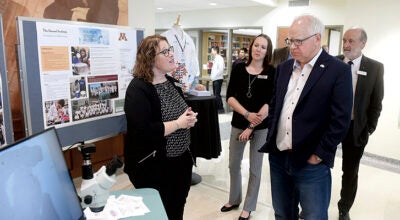18 lawmakers receive shutdown pay
Published 10:35 am Tuesday, August 23, 2011
Murray, Sparks don’t take check; Poppe accepts pay
Eighteen Minnesota House members who declined paychecks during last month’s state government shutdown received full retroactive pay, the House payroll office said Monday.
Area legislators weren’t affected by retroactive pay, although they each chose to do something different with their shutdown paychecks.
Rep. Jeanne Poppe, DFL-Austin accepted her salary throughout the shutdown. She previously said she donates to local organizations throughout the year and, instead of refusing pay or donating her entire check, will continue to donate on a regular basis.
“I always donate money throughout the year,” she said.”I was working during that time on behalf of my constituents.”
Rep. Rich Murray, R-Albert Lea, declined shutdown pay.
Eleven House Democrats and seven Republicans received shutdown pay averaging $1,600 after the 20-day state shutdown, which threw 22,000 state employees out of work and interrupted services ranging from camping in state parks to taking driver’s license exams. State employees were eligible for unemployment at a fraction of their normal pay during the closure.
Fourteen state senators who declined shutdown pay didn’t have the option of getting it retroactively. Democratic Sen. Dan Sparks, of Austin, donated his pay for the time of the shutdown to the United Way of Mower and Freeborn counties.
“I believe donating my salary to the United Way is the next best option — it keeps the dollars local and helps support our communities,” Sparks said in a letter to the Herald.
Lawmakers were entitled to salaries when government closed for much of July, but about a third of the Legislature’s 201 members told the payroll offices they didn’t want to be paid. The Legislature continued operating during the shutdown, even though the Capitol and State Office Building were closed to the public. Lawmakers continued constituent work and some held public meetings in their districts.
After the shutdown ended, the 18 House members who initially declined pay took the option of receiving retroactive paychecks. Another 32 state representatives followed through on a shutdown pay cut averaging $1,600, the amount they would have earned during the shutdown. The remaining 84 House members were paid normally during the shutdown.
— The Associated Press contributed to this report.





